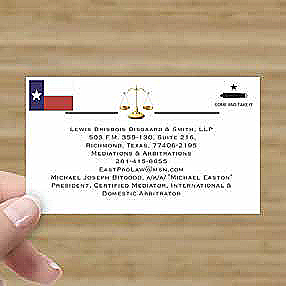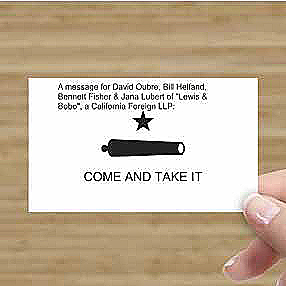Judges on the U.S. Court of Appeals for the Fifth Circuit condemned the actions of two lawyers who helped plaintiffs in a landlord dispute claim the name of a prominent national law firm to prevent that firm from defending its clients.
The judges’ condemnation was part of an eight-page opinion that determined a trial judge correctly granted law firm Lewis Brisbois Bisgaard & Smith an injunction in a trademark infringement lawsuit the firm brought against lawyers Bradley B. Beers and Susan C. Norman and nonlawyer Michael Joseph Bitgood, who also goes by Michael Easton and who has represented himself pro se.
In the opinion, the judges characterized conduct by Norman and Beers throughout the case as “unbecoming of the profession” and said it likely violated several Texas Disciplinary Rules of Professional Conduct.
Norman and Beers did not respond to requests for comment.
According to the opinion, it all began in January 2022, when Bitgood and another man, Richard P. Jones, filed a lawsuit in a Texas state court against an apartment complex and landlords whom they alleged improperly charged rental fees and filed eviction petitions. The apartment complex hired Lewis Brisbois to represent it.
Bitgood and Norman, Jones’ lawyer, discovered that Lewis Brisbois’ foreign limited liability partnership registration had lapsed on the Texas secretary of state website and swooped in to claim the name during the state court litigation.
Lawyers and spokespeople for Lewis Brisbois did not respond to requests for comment.
According to the Fifth Circuit, Bitgood and Norman registered a domestic limited liability partnership under the name “Lewis Brisbois Bisgaard & Smith, LLP” (“Bitgood Entity”). Beers filed an assumed name certificate, claiming “Lewis Brisbois Bisgaard & Smith.”
Bitgood and Norman then amended their petition against the landlords to include Bitgood Entity as a plaintiff and filed a motion arguing the Lewis Brisbois firm lacked authority to represent its clients on the date the firm entered its appearance. The state court judge granted the motion.
Lewis Brisbois then filed its lawsuit in Houston federal court alleging trademark infringement, trade name infringement and unfair competition.
That landlord dispute in state court was settled in November 2022; the amount is confidential. The landlords were represented by Thompson, Coe, Cousins & Irons in the settlement.
When reached by The Texas Lawbook, Bitgood admitted the move was “petty” and not worth the time and money spent on the ensuing litigation, but he maintained that it was a winning strategy and within the bounds of the law.

“What’s the best way to win your case? Knock out your opponent, knock out their pleadings and win the case,” Bitgood said. “So, that’s exactly what we did.”
Lewis Brisbois emailed a cease-and-desist letter to Bitgood and Norman. Bitgood responded with attached photos of fake business cards inscribed with the name “Lewis and Bobo” and “COME AND TAKE IT” with a depiction of a cannon.
The Fifth Circuit judges were not amused.
“Common sense, clear concessions by Federal Defendants, and case law establish that their alleged infringing uses were ‘uses in commerce,’” the judges wrote. “It is clear that the only reason Federal Defendants created the Bitgood Entity was to ride on the back of LBBS’s goodwill and reputation in the marketplace to obtain clients for themselves.”

“Why else would Norman and Bitgood become members of the Bitgood Entity and even offer the same services as LBBS?” the judges continued. “The record all but confirms this as both Bitgood and Norman concede that they stole LBBS’s marks because it was a ‘good business investment.’”
Bitgood contends their actions were “perfectly legal, perfectly ethical.”
“But I get the message. The court is sending us a clear message. They didn’t like what we did,” Bitgood said. “It was perfectly legal, perfectly ethical.”
After the Fifth Circuit issued its ruling affirming the injunction on July 31, the case returned to U.S. District Judge Keith P. Ellison’s courtroom. He held a hearing Tuesday on cross motions for summary judgment and a plaintiff’s motion for a permanent injunction. He has not yet ruled on these, but he gave the parties until Aug. 13 to submit any further arguments and said he’d likely rule without another hearing.
The judge told the parties he wasn’t sure whether he was obligated to refer Norman and Beers to the Texas State Bar’s disciplinary arm. He offered them an opportunity to speak in their defense.
Samuel Wallace Dunwoody, representing Beers, argued Beers’ role was not inappropriate because he simply registered the business with the secretary of state and was not a member of the LLP. Even if Beers’ conduct were alleged to be wrongful, Dunwoody continued, he should be entitled to attorney immunity.
“It was part of the discharge of his duties to a client and that kind of conduct, registering an entity with the secretary of state, is not foreign to the duties of a lawyer,” Dunwoody said. “He should be dismissed from this lawsuit.”
Norman said she echoed Dunwoody’s argument and added an assertion that Lewis Brisbois’ pleadings lack a finding of fraud.
“The allegation of fraud apparently was something the court of appeals took up, and I think the record is clear – it wasn’t there,” Norman said. She asked the judge not to make a referral to the Texas State Bar.
William Scott Helfand, a Lewis Brisbois partner representing his firm, pressed the judge to make a referral. Helfand challenged Dunwoody’s characterization of Beers’ involvement and argued the trio repeatedly used the law firm’s name to do business.
“Whether the court thinks that there’s a potential violation of state bar rules is within the court’s discretion but I’ve always found that when a judge, state or federal, thinks that there’s a potential state bar rule violation that the court refers to the state bar and lets them decide,” Helfand said.
The judge has yet to rule on cross motions for summary judgment and a plaintiff’s motion for a permanent injunction. He gave the parties a deadline of Aug. 13 to submit any further arguments and said he’d likely rule without another hearing.
Bitgood said he’d agreed in 2022 to cease using the Lewis Brisbois name and Norman accused Lewis Brisbois of “unreasonably” prolonging the litigation.
“You don’t need to convince me that this case has been over-litigated and is totally unnecessary,” Judge Ellison told Norman.
Lewis Brisbois is also represented by Bennett Greg Fischer, Sean Benjamin Braun and Shane Lesley Kotlarsky.
The case is Lewis Brisbois Bisgaard and Smith v. Bitgood et al, case number 4:22-cv-03279 in the Southern District of Texas.
